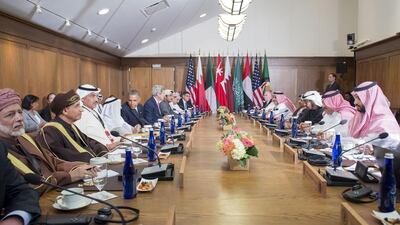Perhaps the best way of summing up the historic meeting between leaders of the GCC and the US president at Camp David came from Adel Al Jubeir, Saudi Arabia’s foreign minister. “This was not,” he said, “a session where we said, ‘We want,’ and the US said, ‘We give’.” It was, instead, a meeting aimed at elevating the US-Gulf relationship to a new level.
In that, it succeeded. Not everything mooted in the media in the days before the summit came to pass, but in terms of the commitments established, the language used and the unspoken messages telegraphed, Gulf leaders will have flown home over the weekend satisfied that a new era in relations has begun.
Start with the commitment. Barack Obama pledged to protect the Gulf from external aggression and to “address” Iran’s activities in the region. He stopped short of pledging to intervene in Syria, but, taken in tandem with the greater security cooperation and military assistance that the US has promised, there was a recognition of the vital role played by the US-Gulf relationship. That, in particular, was what America wanted to convey, aware that its negotiations with Iran have been viewed warily by GCC leaders.
Mr Obama also used the word “destabilising” to describe Iran’s meddling – suggesting that the main message that the Gulf was hoping to convey has been heard. That message, in addition to the united front displayed and the symbolism of Camp David, will have been received in Tehran.
Understanding the destabilising impact of Iran is vital, because, for all the talk about new fighter jets and missiles, the real destructive nature of Iran’s meddling is in undermining governments and the rule of law. The consequences of this could not have been clearer over the weekend: in Syria, where Iran supports the Assad regime, the civil war has allowed ISIL to almost enter the ancient city of Palmyra. In Iraq, ISIL took over Ramadi; Iran’s meddling there aided the sectarian narrative that undermined the cohesion of the country.
The GCC leaders will have left Maryland satisfied but wary. Mr Obama’s “ironclad” commitment to Gulf security will be honoured. But in the absence of a treaty, who can say what the next president, and the one after that, will do? The security of the GCC must be in the hands of the Gulf, which is why Gulf leaders are so keen to acquire critical defence systems. In the long-run, whether America stays in the region or sails away, the region must have the ability to defend itself, on its own terms.

